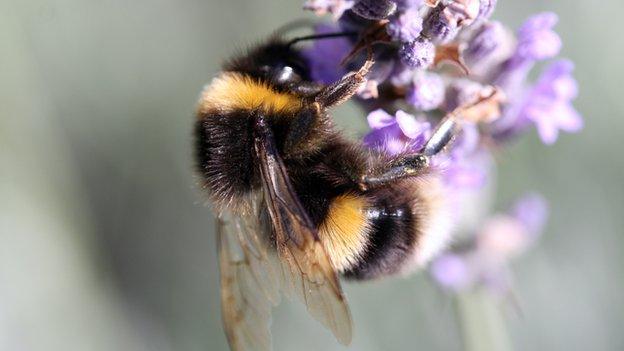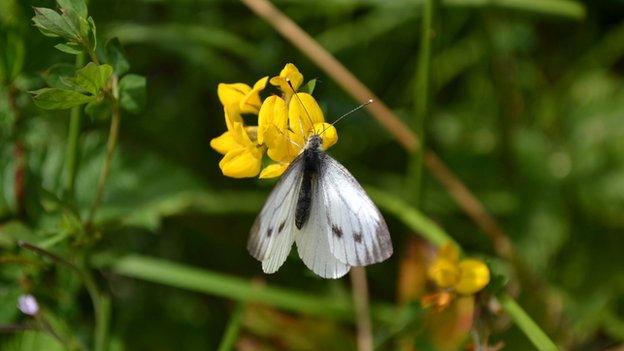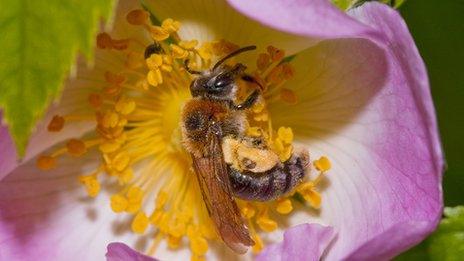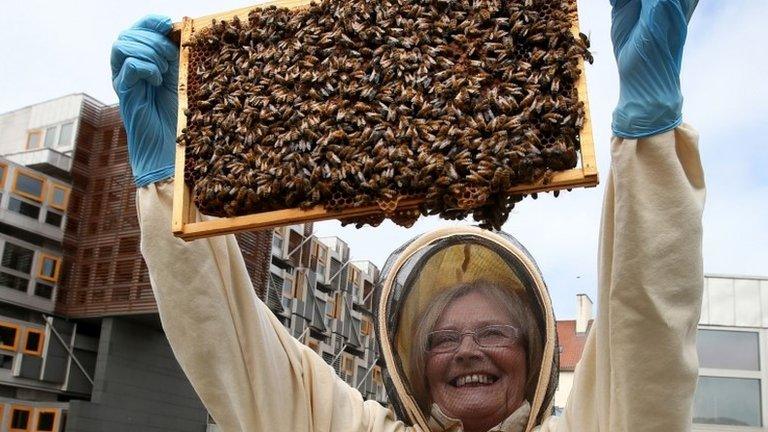Pesticide ban call to save bees
- Published

Scotland's bumblebee population is said to have declined by 60% over the past 50 years
MSPs have called on ministers to ban certain pesticides during a Holyrood debate on the plight of bees.
SNP MSP Angus MacDonald tabled a motion calling for action to "reduce pesticides that harm pollinators".
The Scottish Wildlife Trust believes pesticides known as neonicotinoids are partly to blame for a 60% decline in the bumblebee population.
The Scottish government said it was adopting a "precautionary approach" pending more research.
The trust said there had been a 60% decline in the number of bumblebees in the past 50 years and other important pollinators including hoverflies and butterflies were under threat.
Species such as the great yellow bumblebee have become rarer and confined to the north and west of Scotland while butterflies such as the marsh fritillary and the pearl bordered fritillary had also dwindled, it said.
'Action plans'
Mr MacDonald's motion in parliament backed a call from the campaign group Buglife, external for "the Scottish government to develop and implement action plans, coordinate pollinator monitoring programmes, reduce pesticides that harm pollinators and conserve pollinator species while maintaining places for pollinators to feed and breed".
The Liberal Democrat SNP for Orkney, Liam McArthur, said: "Loss of habitat, use of pesticides and insect disease are all thought to be factors in this decline.
"However, as islands we have a unique opportunity to put in place more effective measures to protect our bee populations.
"As well as supporting further research into pesticides that are less harmful to pollinators, I want to see steps taken to restrict the import of bees and hives into Orkney.
"Given the devastating impact that the varroa mite has had on bee numbers in Orkney and elsewhere, even a voluntary ban would go some way to providing much needed extra protection."
The varroa mite, a parasite which feeds off a bee's blood, has been associated with the decline of honeybee populations worldwide.

The Scottish Wildlife Trust says butterflies and other pollinators such as hoverflies are also under threat
Nectar networks
The Scottish Wildlife Trust has begun a number of initiatives including the creation of a "nectar network" between Troon and Irvine in Ayrshire by planting wildflowers to connect habitats for wild pollinators.
Head of policy, Dr Maggie Keegan, said: "The trust believes the decline in wild pollinators and honeybees may act like the 'canary in the mine' - indicating that Scotland's landscapes and ecosystems are not being managed sustainably.
"Everyone can do their bit to help these wonderful creatures recover by creating a window box and planting wildflowers in the garden, but it is vital we tackle this issue at the landscape-scale to create a 'nectar network' across Scotland.
"The trust hopes this debate converts words into action from the Scottish government.
"At the very least, the trust would like to see the Scottish government commit to banning harmful pesticides such as neonicotinoids outright and supporting research into pollinators and low-pesticide farming systems."
A Scottish government spokesman said it was "committed to taking a precautionary approach on the use of neonicotinoids".
The spokesman added: "It is essential, given concerns that have been expressed about the efficiency of previous Defra funded field trials, that we await further research that clearly and properly demonstrates the nature and extent of risk that neonicotinoids pose to bees, and other pollinators, when they are foraging."
- Published24 June 2014

- Published18 June 2014
